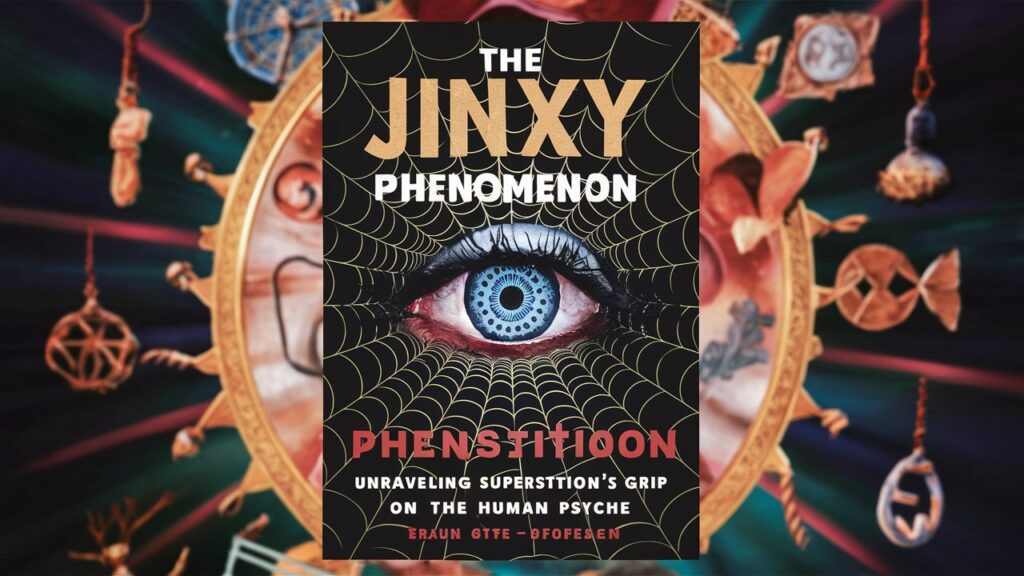Introduction: The Whisper of Misfortune
The term “jinxy” evokes an unsettling blend of curiosity and dread—a colloquial shorthand for the superstitious belief that certain words, actions, or objects invite bad luck. Rooted in folklore yet thriving in modern consciousness, jinxy behavior reflects humanity’s timeless struggle to control the uncontrollable. From athletes avoiding specific phrases before a game to friends knocking on wood after a hopeful prediction, jinxy rituals permeate daily life as psychological armor against chaos. This article delves deep into the origins, psychology, and cultural manifestations of jinxy tendencies, exploring why rational minds cling to irrational safeguards. Beyond mere habit, jinxy practices reveal profound truths about fear, uncertainty, and the human need for narrative in a random universe.
The Ancient Roots of Jinxy: Folklore’s Legacy
Jinxy superstitions trace back to antiquity, where unseen forces were blamed for misfortune. Ancient civilizations attributed plagues, failed harvests, or lost battles to offended deities or malicious spirits. The word “jinx” itself likely derives from “jynx,” a Greek term for a spell-binding bird (the wryneck) used in love charms. Sailors feared uttering “drown” at sea; Romans saw omens in animal entrails. These practices weren’t mere quirks—they were survival strategies. By assigning cause to tragedy (e.g., “I angered the gods”), people gained illusory control. This legacy birthed modern jinxy taboos: saying “quiet shift” in a hospital, mentioning a no-hitter in baseball, or celebrating early. The core belief persists: speaking success tempts fate, summoning disaster through cosmic irony.
The Psychology of Jinxy: Why Our Brains Crave Superstition
Cognitive science reveals jinxy behavior as a byproduct of evolved pattern-seeking. Humans excel at linking cause and effect—a trait vital for learning. But this “hyperactive agency detection” misfires when randomness rules. If someone wears red socks during a victory, the brain falsely credits the socks, not chance. This “illusory correlation” solidifies into jinxy rituals. Psychologists like B.F. Skinner demonstrated this via “superstitious pigeons”: birds repeating meaningless actions that coincidentally preceded food. In humans, anxiety amplifies jinxy tendencies. Fearing failure, we avoid “cursed” topics or cling to talismans, creating a placebo effect of control. Neuroimaging shows ritualistic behaviors reduce amygdala activity, calming stress. Thus, jinxy isn’t ignorance—it’s a coping mechanism against existential helplessness.
Jinxy in Popular Culture: From Cartoons to Corporate Boardrooms
Media immortalizes jinxy tropes, normalizing them across generations. Cartoons like Jinx! (a 1940s cat-and-mouse duo) depicted jinxes as comedic curses, while films like Final Destination weaponized them as fatalistic traps. Sports commentary abounds with jinxy etiquette—broadcasters avoid mentioning “perfect games.” Even corporations succumb: businesses avoid launching products on Friday the 13th, fearing jinxy financial fallout. Social media fuels digital-age superstition; users append “don’t jinx it!” to hopeful tweets. This cultural saturation does more than entertain—it reinforces collective belief. When a celebrity blames a breakup on a jinxed necklace, or a city avoids rebuilding a “cursed” landmark, pop culture validates jinxy logic as shared social truth.

Breaking the Jinxy Cycle: Rationality vs. Ritual
Escaping jinxy thinking requires conscious rewiring of cognitive biases. Therapists use exposure techniques: encouraging clients to deliberately “jinx” scenarios (e.g., declaring “traffic will be awful” before a smooth commute) to disprove magical thinking. Data literacy also helps—studying probability reveals streaks of bad luck as mathematical inevitabilities, not curses. Yet, eradicating jinxy impulses entirely may be unrealistic. As philosopher Daniel Dennett notes, superstition is a “hardwired bug” in human cognition. Instead, balance is key: acknowledging rituals’ comfort (e.g., a lucky pen during exams) while rejecting paralyzing fear. Mindfulness practices can disentangle emotion from action, asking, “Is this ritual helpful or harmful?” When jinxy habits hinder growth—like avoiding career risks due to “cursed” timing—it’s time to relinquish the illusion.
Conclusion: Embracing Uncertainty in a Jinxy World
Jinxy superstitions endure because they’re more than silly habits; they’re narratives that tame chaos. In a world of pandemics, climate change, and personal upheaval, the allure of controlling fate through silence or symbols remains potent. Yet true resilience lies not in dodging imagined curses, but in navigating uncertainty with adaptability. By understanding jinxy’s roots—in history, psychology, and culture—we demystify its power. We can honor tradition without being enslaved by it, laughing as we knock on wood while still taking bold leaps. Ultimately, the antidote to jinxy fatalism is embracing life’s unpredictability, finding courage not in avoiding “bad luck,” but in persisting despite it.
Frequently Asked Questions (FAQs)
Q1: What’s the difference between “jinx” and “curse”?
A jinx implies a temporary, often unintentional hex triggered by speech or action (e.g., boasting invites misfortune). Curses are deliberate, enduring maledictions believed to harness supernatural forces for harm. While jinxes fade if “broken” (e.g., touching wood), curses typically require rituals or counter-magic to lift.
Q2: Can jinxy beliefs be culturally specific?
Absolutely. In Japan, saying “ottoshi” (good luck) before exams is jinxy—it may backfire. Russian culture forbids shaking hands across thresholds to avoid jinxing relationships. These nuances show how jinxy rules reflect localized fears and historical traumas.
Q3: Are children more prone to jinxy thinking?
Yes. Developmental psychologists note that magical thinking peaks in early childhood (e.g., fearing monsters under beds). Kids internalize jinxy ideas via stories or parental habits (“Don’t step on cracks!”). Most outgrow extreme forms, but subtle biases linger into adulthood.
Q4: Do animals exhibit jinxy behavior?
While animals don’t conceptualize “jinxes,” they develop superstitious routines. Skinner’s pigeons pecked walls if food once randomly followed that action. Pets may associate unrelated events (e.g., a leash appearing before a vet visit) with distress, mimicking jinxy avoidance.
Q5: How can I support someone consumed by jinxy anxiety?
Validate their feelings without reinforcing the superstition (“I see this stresses you”). Gently challenge evidence (“Has saying it aloud ever actually changed an outcome?”). Suggest stress-reduction techniques like deep breathing. If rituals disrupt daily life (e.g., obsessive counting), recommend cognitive-behavioral therapy.
Image suggestion: A split image of ancient runes next to a modern “knock on wood” emoji, symbolizing jinxy’s timeless reach.
